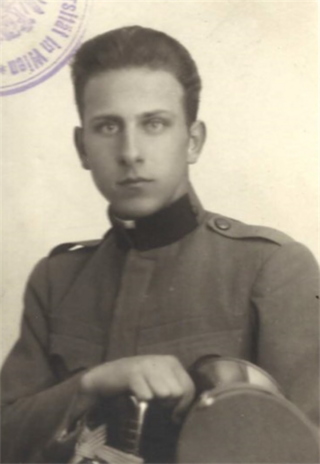Dr. Georg Krasser

Personalia
Born:
Died:
Profession:
Persecution:
Imprisonment 1940 (14 days),
Imprisoned 23.08.1944 - 26.08.1944,
sentenced to death in absentia 06.05.1945
Memberships
Curriculum Vitae
Georg Krasser is a nephew of Robert Krasser. After graduating from the Vienna-Hietzing State High School, he began studying law at the University of Vienna in 1937 and became a member of the student fraternity Norica in 1937. From 1938 to 1939, he was a clerk at the foreign currency office in Vienna.
In September 1939, he was drafted into the German Wehrmacht.
"During my first leave before the start of the offensive against France, I also visited my office at the time (foreign currency office in Vienna) and reported to my roommate about our preparations. I was overheard by an unnoticed third party, who reported me to the Vienna City Command. They passed the report on to my responsible 2nd Armored Division on the border with Belgium. The division commander - obviously not a Nazi - didn't take the matter too seriously and considered a 14-day detention to be sufficient."
In December 1939 and January 1940, however, he was again interrogated by the Gestapo because he had "spoken about the assassination attempt on the Führer [carried out on 8 November 1939 by Georg Elsner (executed on 9 April 1945)] in such a way as if he had known about it beforehand."
He then found military service in Belgium, France, Greece and on the German Eastern Front, where he fell ill with dysentery. After a stay in a military hospital, NCO Georg Krasser was transferred to Artillery Replacement and Training Section 109 in Brno at the end of 1941. Here, his cousin First Lieutenant Hans Janauschek ensured that he was able to remain in the stage after doctors Franz Ritschl and Albert Rheinberger assessed him as unfit for further front-line service. Hans Janauschek is the adjutant of the division commander, Captain Viktor Estermann, the first commander of this unit to come from Austria from December 15, 1943. At the end of January/beginning of February 1942, Georg Krasser begins his service in Brno as the staff's Ilb, in charge of NCOs and enlisted men. Here he formed a resistance group with his cousin and Franz Derndorfer, which was joined by Fritz Kuso (only for a short time due to another transfer), Josef Janauschek (who must have arrived in Brno in July 1944 and was no longer with this unit in December 1944) and other non-ÖC members. This group was also in contact with other military resisters and civilian resistance groups.
After the assassination attempt on Adolf Hitler on July 20, 1944, Georg Krasser was arrested again at 6 a.m. on August 23, 1944 and remained in custody for three days. His home was also searched again. In December 1944, the unit was transferred to Amstetten (Lower Austria). (This relocation may have been in connection with plans by the Austrian military resistance to occupy the town with Wehrmacht units made up of Austrians who had joined the military resistance when Soviet airborne troops were deployed in the Vienna area.)
"Estermann, a professional officer, was horrified, but understood the necessity of my request. And surprisingly explained that I would then have to take responsibility for this, for which he put me (a non-commissioned officer) in charge."
Before the march to Hollenstein, Georg Krasser and 20-30 men free his comrade Constable Hanel, who is in a military detention center in Markt Ardagger (Lower Austria).
"When we arrived in Groß Hollenstein [6.5.1945], we encountered the retreating tip of Army Group South. On the Ybbs bridge, I suddenly came face to face with Field Marshal Rendulic, declared him under arrest without further ado and demanded that he hand over his weapons and follow me to the Rothschild Castle [in Hollenstein]."
After Captain Estermann has released Major General Lothar Rendulic - commander of Army Group South/East Mark from April 1945 - there is an hour-long exchange of fire, which leaves one dead.
Presumably the Secret Field Gendarmerie 177 sentences Estermann, Derndorfer, Janauschek, Krasser and two civilians of the local resistance to death in absentia. The verdict is announced by the Amstetten district court on the official notice board. Most of the Art. Ers. Abt. 109 are sent to Upper Austria and Styria. Around 300 men are taken prisoner by the Soviets.
Georg Krasser is able to escape from captivity and requests Leopold Figl to intervene with the Soviets in order to secure the release of his comrades from captivity, but fails.
After the war, Georg Krasser completes his law studies with a doctorate in law and becomes a lawyer.
Places
Residence:
Citations
- Krause, Peter/Reinelt, Herbert/Schmitt, Helmut (2020): Farbe tragen, Farbe bekennen. Katholische Korporierte in Widerstand und Verfolgung. Teil 2. Kuhl, Manfred (ÖVfStG, Wien), p. 182–184.
